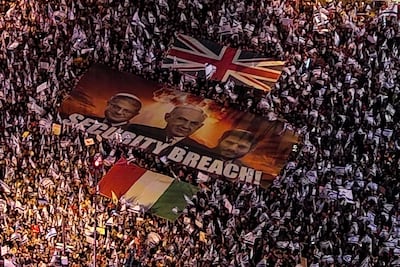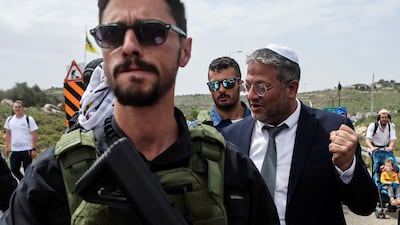Palestinians have criticised Israel's government after a mass incursion by right-wing settlers and political figures into the West Bank and a fiery speech by Prime Minister Benjamin Netanyahu in which he vowed to restore Israeli security "on all fronts".
In a dramatic about-turn on Monday night, Mr Netanyahu also reinstated Defence Minister Yoav Gallant, as he sought to convince Israelis that his government could bring back relative calm after a rise in deadly violence.
Ahmad, a Palestinian from the mixed city of Umm Al Fahm told The National that the prime minister's speech was an "expected disappointment".
"Mr Netanyahu is clearly helpless," he said.
a Palestinian from Umm Al Fahm
"We assumed he was going to initiate a process of some sort, but instead he blamed his woes on the opposition and repeated vague reassurances that 'our enemies will pay'.
"His tone is increasingly fascistic and out of touch with reality."
Mr Netanyahu’s speech followed a poll released the previous day by Israeli network Channel 12, which showed a crushing drop in support for the Prime Minister’s Likud party, and indicated that the governing coalition would fall well below the threshold required to form an administration if an election were held today.
The poll also identified a surge in support for Benny Gantz’s National Unity party, which it says would more than double its seats.
Suheil, from Nazareth, told The National that the speech showed the extent of the crisis facing Mr Netanyahu and his government.
"The speech left me very afraid that he might be aiming for a new military operation against Palestinians and others after Ramadan. It would be a very, very bad one," he said.
"The march in the West Bank yesterday gave us Palestinians yet more signs that the orientation of this government is towards more tension and military operations, not dialogue."
Adel, from the northern city of Akka, said that the tougher rhetoric on settlements and security was a reflection of the country's turbulent internal politics.
"Israel can only deal with its internal struggles among Jews at the moment, and even those questions are hugely complex. There’s nothing at all they can do to ease the situation with Palestinians."
Mr Netanyahu also used Monday’s speech to blame the previous government for a recent rise in rocket fire between Israel and terror groups in Lebanon and the Gaza Strip and Syria towards the end of last week, as well as a recent rise in Palestinian terror attacks.
“Our country is under a terrorist assault … it did not start now. Under the previous government, the number of terror attacks doubled,” he argued.
Naftali Bennett and Yair Lapid, both of whom served as prime minister during the previous government, hit out at the speech, with Mr Lapid urging Mr Netanyahu to “take responsibility”.
On Lebanon, Mr Netanyahu blamed the previous government for handing over “territory and gas deposits to the enemy without receiving anything in return,” a reference to the US-mediated maritime border deal struck between Lebanon and Israel last year.
He also accused his predecessor of signing a “surrender agreement with Hezbollah,” although the maritime deal — struck in October of last year following over a decade of negotiations — was reached between the governments of Israel and Lebanon.
Mr Netanyahu in his prime time address also emphasised that he would not permit Hamas to establish itself in Lebanon.
Israel has held the Palestinian armed movement responsible for the volley of rockets fired from Lebanon into Israel last week, although no groups have publicly claimed responsibility for the attack. The Israeli army responded by bombarding “Hamas terror infrastructures” it said belonged to Hamas in the Gaza Strip and southern Lebanon.
Last week’s exchange of rockets between extremists firing from inside Lebanon and Israeli forces is the largest escalation of violence across the border since the 2006 conflict, when Israel waged war against Hezbollah.

On Syria, Mr Netanyahu said “the Al Assad regime knows that the price we exacted is only the beginning”, in reference to Sunday’s retaliatory strikes by Israel against the country.
Tensions soared with Israel’s enemies last week after footage emerged of police beating worshippers at the Al Aqsa mosque in Jerusalem, the third holiest site in Islam.
Israel claims it was clearing the flashpoint compound of rioters who were stockpiling weapons inside the building.
The conflict has this year claimed the lives of at least 94 Palestinians, 19 Israelis, one Ukrainian and one Italian, according to an AFP count.
These figures include, on the Palestinian side, combatants and civilians, including minors, and on the Israeli side, mostly civilians, including minors, and three members of the Arab minority.















